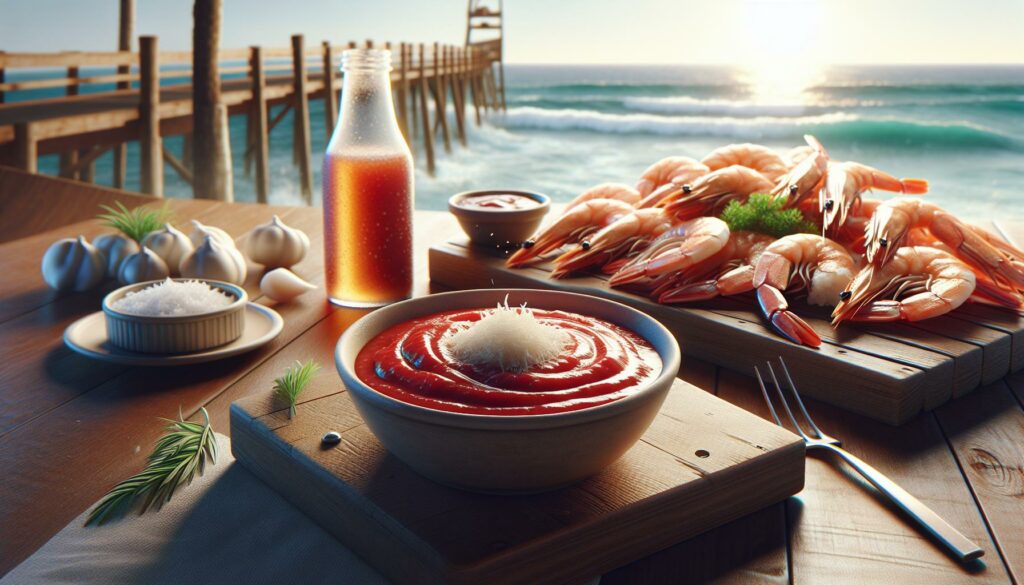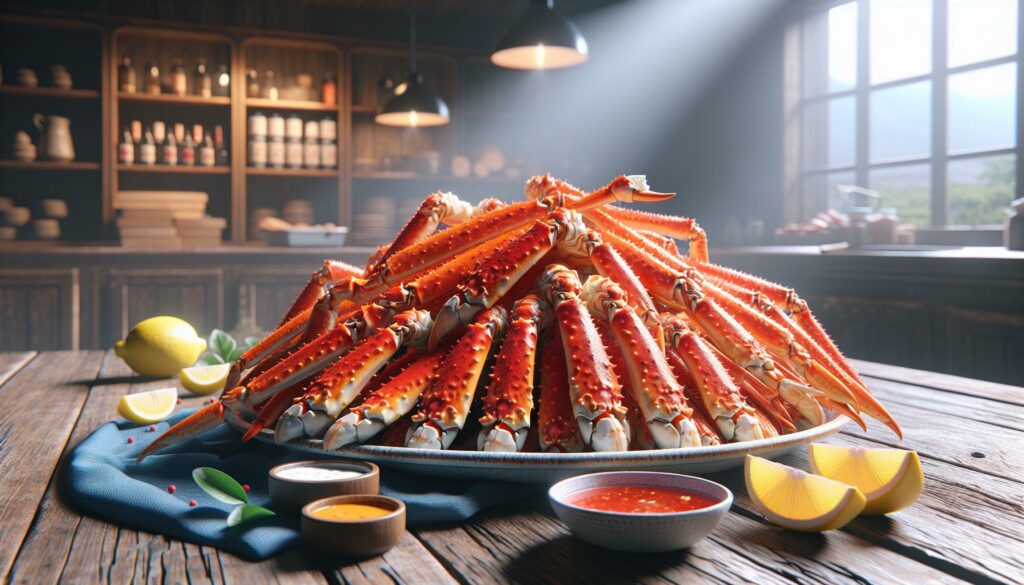When it comes to seafood condiments cocktail sauce reigns supreme as the go-to dipping companion for shrimp and other oceanic delights. This zesty sauce with its signature blend of tomatoes horseradish and spices has been jazzing up seafood platters since the 1960s.
While many seafood enthusiasts can’t imagine their shrimp cocktail without this tangy sidekick they often wonder about its nutritional impact on their diet. The good news is that cocktail sauce typically contains fewer calories than many other condiments making it a relatively guilt-free choice for health-conscious diners. But there’s more to this popular sauce than just its calorie count – from its vitamin-rich tomato base to its metabolism-boosting horseradish the nutritional profile might surprise even the most dedicated food enthusiasts.
Cocktail Sauce Nutrition
Cocktail sauce is a tangy seafood condiment that combines a tomato base with zesty horseradish. This classic sauce emerged in the mid-20th century as the perfect accompaniment to shrimp cocktails and other seafood dishes.
Traditional Ingredients
The foundation of cocktail sauce starts with a ketchup or chili sauce base, paired with freshly grated horseradish root. The standard recipe incorporates Worcestershire sauce for umami depth and freshly squeezed lemon juice for brightness. Additional components include black pepper, hot sauce like Tabasco, plus salt to enhance the overall flavor profile. Each ingredient contributes to the signature taste that makes cocktail sauce distinct from other seafood condiments.
Common Variations
Regional adaptations of cocktail sauce feature unique ingredient combinations to suit local tastes. Some recipes incorporate prepared mustard or wasabi for extra heat, while others add minced garlic or shallots for complexity. Latin American versions often include cilantro and lime juice instead of lemon. Asian-inspired variations incorporate ginger, rice vinegar or soy sauce. European interpretations might feature cognac or brandy additions. These modifications maintain the sauce’s essential character while offering different flavor dimensions for various culinary applications.
Nutritional Content of Cocktail Sauce
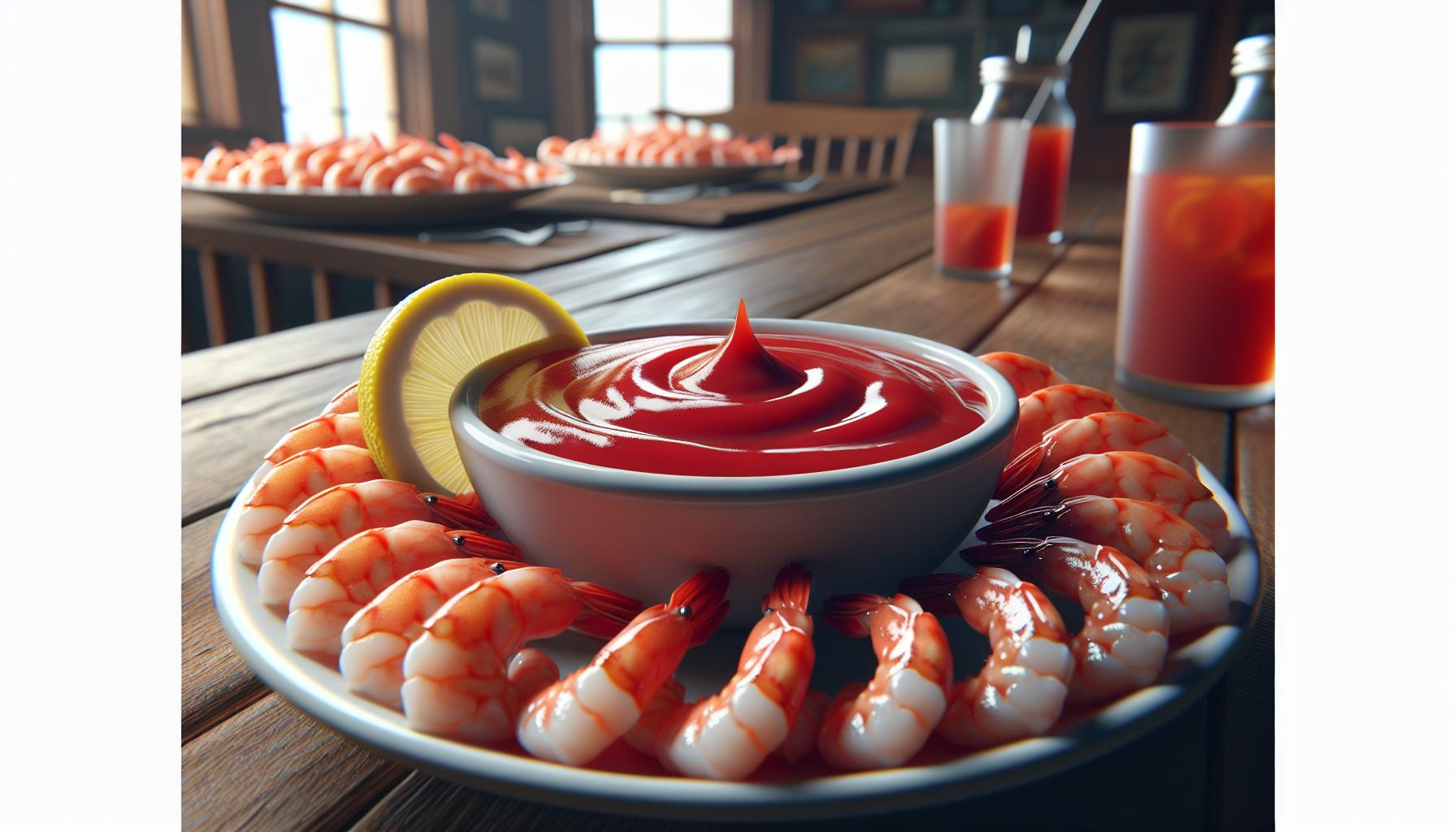
Cocktail sauce combines multiple ingredients that contribute to its unique nutritional profile. The sauce maintains a relatively low caloric content while offering various micronutrients from its tomato base and spice components.
Calories and Macronutrients
A 2-tablespoon (30g) serving of cocktail sauce contains 25 calories. The macronutrient breakdown shows 6g of carbohydrates with 5g coming from natural sugars. The sauce provides 0g of fat and 0g of protein per serving.
| Nutrient | Amount per 2 tbsp (30g) |
|---|---|
| Calories | 25 |
| Total Fat | 0g |
| Carbohydrates | 6g |
| Sugars | 5g |
| Protein | 0g |
| Sodium | 280mg |
Vitamins and Minerals
The tomato base in cocktail sauce provides vitamin C with 4% of the daily recommended value per serving. The sauce contains essential minerals including potassium at 120mg per serving. The horseradish component adds trace amounts of calcium magnesium zinc.
| Vitamin/Mineral | % Daily Value |
|---|---|
| Vitamin C | 4% |
| Potassium | 3% |
| Iron | 2% |
| Calcium | 1% |
| Vitamin A | 2% |
Health Benefits of Key Ingredients
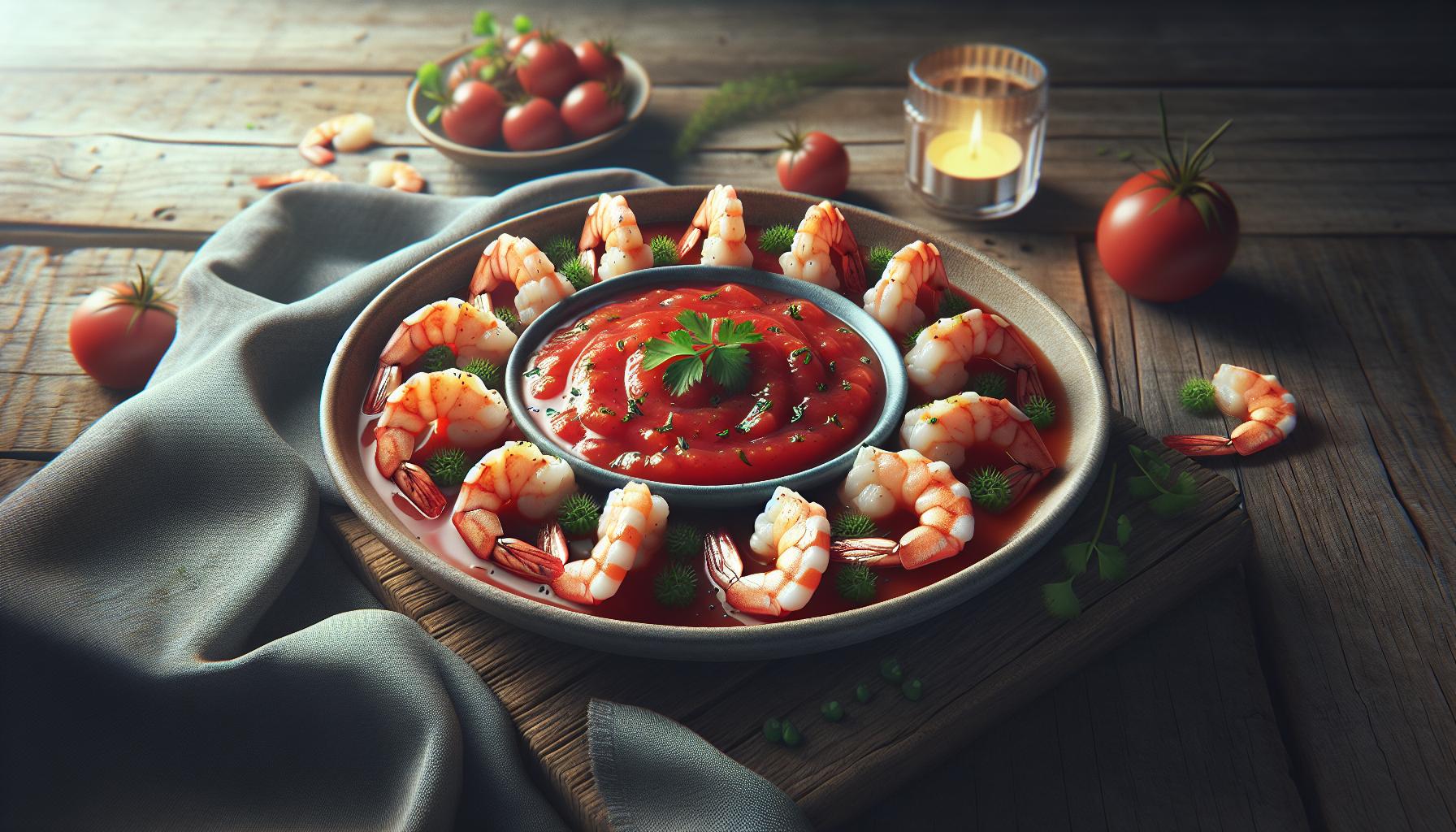
The primary ingredients in cocktail sauce contribute essential nutrients and bioactive compounds. Both horseradish and tomatoes deliver distinct health advantages through their unique nutritional profiles.
Horseradish Benefits
Horseradish contains powerful glucosinolates that support immune system function. These compounds activate natural detoxification enzymes in the body, enhancing cellular protection. The root vegetable delivers significant amounts of vitamin C, with 1 tablespoon providing 3.7mg or 4% of the daily value. Horseradish includes calcium, potassium, magnesium which promote bone health and regulate blood pressure. Its naturally occurring compounds demonstrate antimicrobial properties against common pathogens. The spicy root contains antioxidants like sinigrin that combat oxidative stress in cells.
Tomato-Based Benefits
Tomatoes provide lycopene, a potent antioxidant that protects cells from damage. One serving of cocktail sauce delivers 4% of the daily recommended vitamin C intake through its tomato base. The sauce contains potassium from tomatoes, supporting healthy blood pressure levels. Tomatoes contribute beta-carotene and vitamin K, promoting eye health and proper blood clotting. The natural compounds in tomatoes include flavonoids that reduce inflammation markers in the body. These red fruits supply fiber, supporting digestive health and helping maintain steady blood sugar levels.
Potential Health Concerns
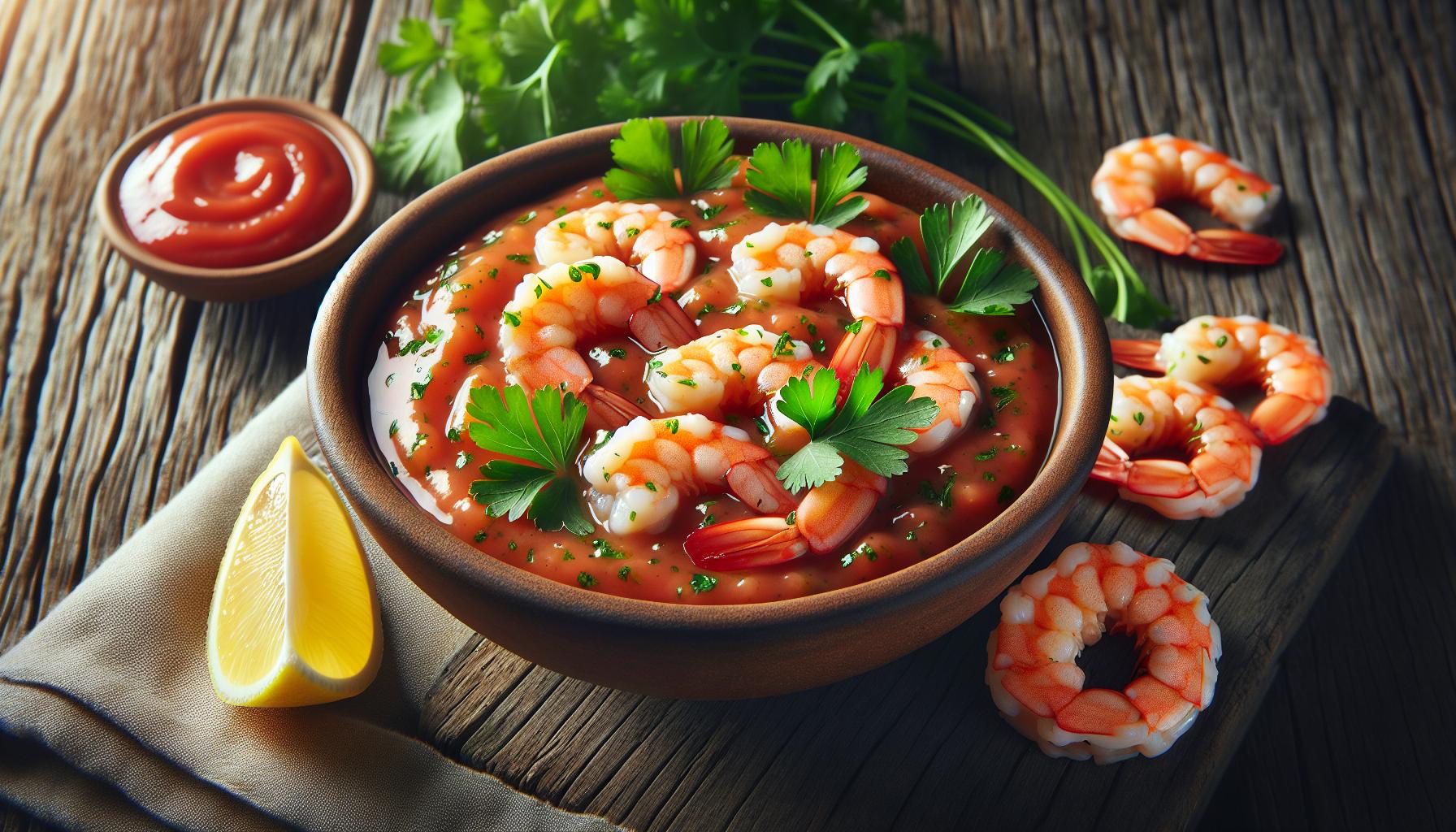
Cocktail sauce presents specific dietary considerations despite its relatively low calorie content. Understanding these concerns helps make informed decisions about consumption amounts.
Sodium Content
A 2-tablespoon (30g) serving of cocktail sauce contains 350mg of sodium, approximately 15% of the recommended daily intake. The high sodium content stems from multiple ingredients including ketchup, Worcestershire sauce, added salt. Individuals with hypertension, heart conditions or sodium restrictions benefit from monitoring their cocktail sauce portions. Several low-sodium alternatives exist:
- Homemade versions with reduced salt
- Salt-free tomato bases
- Fresh lemon juice to enhance flavor without sodium
- Herb-based substitutes using fresh dill or parsley
Added Sugars
Commercial cocktail sauce contains 4-5g of added sugars per serving, primarily from the ketchup base. The American Heart Association recommends limiting daily added sugar intake to 25g for women and 36g for men. Natural alternatives reduce sugar content while maintaining flavor:
- Pure tomato puree instead of ketchup
- Sugar-free ketchup alternatives
- Fresh grated horseradish root
- Monk fruit or stevia sweeteners
- Balsamic vinegar for natural sweetness
Each tablespoon of traditional cocktail sauce contributes approximately 2.5g of added sugars to the daily intake.
Homemade vs Store-Bought Options
Store-bought cocktail sauce contains preservatives with higher sodium levels ranging from 350-500mg per 2-tablespoon serving. Leading commercial brands include additional ingredients like corn syrup high fructose corn syrup modified food starch.
Homemade cocktail sauce offers superior nutritional benefits through:
- Fresh horseradish providing 41mg potassium per tablespoon
- Natural tomato paste delivering 4.6mg vitamin C per tablespoon
- Custom sodium control allowing 40-60% reduction in salt content
- Zero artificial preservatives or added sugars
- Pure ingredients without fillers or thickeners
| Nutrient (per 2 tbsp) | Homemade | Store-Bought |
|---|---|---|
| Calories | 20 | 25 |
| Sodium (mg) | 150 | 350 |
| Added Sugars (g) | 0 | 4-5 |
| Preservatives | 0 | 2-4 |
Creating cocktail sauce at home enables precise portion control customization of heat levels through:
- Adjusting horseradish quantities for preferred spiciness
- Selecting low sodium tomato products as the base
- Using fresh lemon juice instead of citric acid
- Adding natural seasonings like garlic powder black pepper
- Incorporating fresh herbs such as parsley or chives
Storage considerations differ between options. Homemade versions maintain peak freshness for 5-7 days refrigerated while commercial products last 3-6 months unopened. Fresh ingredients impact shelf life but deliver superior taste nutritional benefits compared to processed alternatives.
Choice for Seafood Lovers
Cocktail sauce stands out as a versatile and relatively healthy condiment choice for seafood lovers. While store-bought versions offer convenience they often come with higher sodium and added sugars. Making cocktail sauce at home provides better control over ingredients and nutritional content while delivering superior flavor.
The combination of vitamin-rich tomatoes and immune-boosting horseradish makes this sauce more than just a tasty addition to meals. For health-conscious individuals a homemade version can be customized to align with specific dietary needs without sacrificing the classic zesty taste that’s made it a beloved seafood companion for generations.

